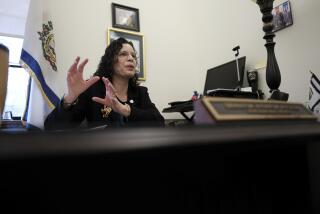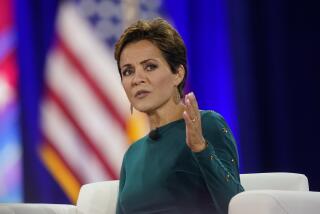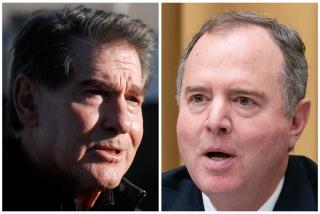Virginia Senate race comes down to the wire
- Share via
FALLS CHURCH, Va. — Towering in his cowboy boots, Republican George Allen, the son of a revered football coach, marveled at the taste of the salty-sweet chanh muoi lemonade as he courted Vietnamese American small-business owners in his comeback bid for the U.S. Senate, a seat he lost six years ago after he uttered a racial slur.
His opponent, Tim Kaine, who volunteered in Honduras as a young law school student, spoke into a camera about “valores” — values in Spanish — for a television ad believed to be the first time a candidate fluent in Spanish directly addressed Latino voters in the Old Dominion. He did not mention his highly partisan role as past chairman of the Democratic National Committee.
The extremely close race for Senate here has these two political titans — former governors, both — appealing to slim slices of the electorate in their daily drive to find and sway undecided voters.
With nearly $30 million spent by outside groups alone, the campaign is on track to be the nation’s most expensive in the battle for control of the Senate. The impending retirement of Democratic Sen. Jim Webb, who defeated Allen in 2006, has Democrats struggling to keep the open seat in their column — and with it the Senate majority.
Voters have barely budged after a relentless 18-month battle. Kaine has a slight lead in the polls, but the race is a statistical dead heat. The two are known quantities, and the endless loop of attack ads and feel-good spots have done little to shift opinions.
A few thousand voters are expected to decide the election in this increasingly diverse commonwealth, one of just a few Senate contests where the candidates are inextricably yoked to the top of the ticket. Mitt Romney and President Obama, also in a statistical tie, make regular stops in Virginia and their campaigns are coordinating with their Senate counterparts.
For the Senate campaign, like the presidential, women are among the most crucial undecided voters, and Kaine and Allen have pitched their messages toward them. Both make appeals to women on kitchen table issues, but social issues are an undercurrent. Allen opposes abortion, with some exceptions, while Kaine pledges to uphold Roe vs. Wade.
This is where abortion and contraception catapulted to the front of the national debate after the Republican-controlled statehouse sought to require women to undergo a transvaginal ultrasound before an abortion — drawing outrage from women’s groups.
The intensive role Virginia’s former first ladies are playing on the campaign trail, with almost as many daily stops as their husbands, underscores the potency of women’s issues this election year.
On one recent day, Kaine’s wife, Anne Holton, joined a noontime women’s vote event in Roanoke, while Susan Allen had a dizzying schedule of stops, including visits to a pumpkin patch, a healthcare forum and a high school football game in Lynchburg. Forty-eight hours later Holton was revving up volunteers in military-rich Hampton Roads; Susan Allen rallied in coal country in the state’s southwest.
Jobs are the top issue in this economically divided state, where the northern suburbs around Washington tilt Democratic and the more rural south side leans Republican.
Early on, the Allen campaign sought to link Kaine’s fortunes to Obama’s economic policies, and many strategists doubted Obama could reprise his 2008 sweep of Virginia, the first Democratic presidential nominee to win the state in four decades.
“Reckless spending, red ink, higher taxes, they have a lot in common: We work hard to save; Obama and Kaine tax and spend,” says one ad from Crossroads GPS, a Republican-affiliated outside group.
With many of the regional economies dependent on military spending, the deep Defense Department cuts scheduled for next year have provided an easy line of attack on Kaine’s ties as a handpicked ally of the Obama administration.
But Allen’s track record during his term in the Senate — and the go-go years of tax cuts and rising deficits during George W. Bush’s administration — has given Kaine an easy counterattack on Allen as fiscally irresponsible.
Rather than run from Obama, Kaine has embraced his role alongside the president — joining him at rallies — while distancing himself on some issues. Kaine, for example, would allow tax hikes on couples making more than $500,000 rather than $250,000, as is the White House position.
Here on the northern edge of the South, Allen’s once swashbuckling bravado — his late father, also named George Allen, was a Washington Redskins and Los Angeles Rams football coach much admired in these parts — has allowed Kaine to portray him as another tea-party-styled extremist. Allen, who was raised in Southern California, once hung a noose in his office, which he has explained was Western memorabilia.
“Washington needs more partners and fewer partisans,” reads one Kaine ad that shows him working alongside both Obama and Bush.
Kaine at times still resembles the earnest young law student who worked with Jesuit missionaries before becoming a lawyer and mayor of Richmond. He has a task like that of so many other swing-state Democrats: to stake out ground in the political middle without alienating his party’s base or the independents who could tip the vote.
Walking such a line is not without its trials: Kaine’s suggestion that he would be open to having all Americans pay at least a minimal tax — a common Republican position — swiftly found its way into an ad deriding him as a tax-and-spend Democrat.
At the same time, Allen, a lawyer who served in the state House of Delegates and U.S. House, can appear awkward as he tries to appeal to the new South. Six years ago, he was considered a future presidential contender until he pointed out a young opposition campaign worker of Indian heritage who was videotaping him and referred to him with the derogatory term “macaca.”
“I can speak French. Do you all speak francais?” Allen said to the Vietnamese American business owners at a popular Asian shopping center just across the Potomac River from the nation’s capital. None them took him up on the offer to switch to the language of their homeland’s colonial past.
But Anh Nguyen, president and publisher of Pho Nho, a local Vietnamese newspaper, said Allen appeared to have learned from his past missteps. “He’s doing much better,” she said.
Allen perked up when she mentioned she was neither Democrat nor Republican.
“You are exactly the key type of person who can help us win,” he said.
More to Read
Sign up for Essential California
The most important California stories and recommendations in your inbox every morning.
You may occasionally receive promotional content from the Los Angeles Times.










